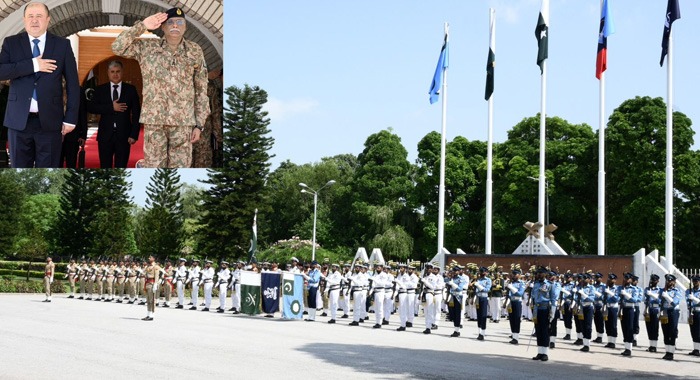In a move reflecting growing strategic alignment in Central and South Asia, Major General Saidzoda Babajon Abdulqodir, Chief of the General Staff and First Deputy Minister of Defence of Tajikistan, paid an official visit to the Joint Staff Headquarters in Rawalpindi, where he met with Chairman Joint Chiefs of Staff Committee, General Sahir Shamshad Mirza.
During their meeting, both military leaders held in-depth discussions on regional security challenges, with particular attention to counter-terrorism cooperation, border security, and the shifting geopolitical landscape following NATO withdrawal from Afghanistan and ongoing instability in the region.
They underscored the importance of bilateral strategic cooperation, particularly in light of shared concerns over transnational extremist networks, drug trafficking routes, and the growing need for intelligence coordination in Central and South Asia.
General Sahir Shamshad welcomed the Tajik dignitary and reaffirmed Pakistan’s commitment to strengthening defence diplomacy with Central Asian partners. Major General Saidzoda commended the professionalism of Pakistan’s armed forces and paid tribute to the country’s sacrifices in the fight against terrorism.
Tajikistan and Pakistan, both bordering Afghanistan, have faced spillover threats from Taliban-controlled territory, including cross-border militancy, arms smuggling, and ideological infiltration. This visit is viewed by defence analysts as part of a broader effort to build a regional security consensus, especially as terrorist networks like IS-Khorasan Province (IS-KP) expand their footprint in the region.
The guard of honour presented to the visiting general by all three branches of Pakistan’s military also symbolised the growing military-to-military trust between the two nations — a relationship likely to gain further importance amid rising concerns over ungoverned spaces and militant sanctuaries across the Afghan border.
As both nations navigate a complex regional environment, today’s engagement underscores the strategic importance of bilateral defence ties not just as ceremonial, but as a pragmatic partnership rooted in shared threats and mutual security interests.





